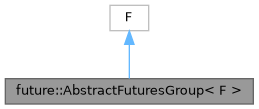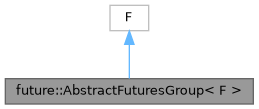Abstract class to allow aggregation of several futures. More...
#include <fastarduino/future.h>


Protected Member Functions | |
| AbstractFuturesGroup (FutureNotification notifications=FutureNotification::NONE) | |
| Construct a new AbstractFuturesGroup. More... | |
| void | init (utils::range< F * > futures, uint16_t actual_size=0) |
| Called from constructors of subclasses, this method allows this group to listen for the status of all its futures. More... | |
| void | on_status_change_pre_step (const F &future, FutureStatus status) |
This must be called by subclasses on_status_change() method, after checking that future is one of the futures handled by this instance, and before performing any further processing. More... | |
Static Protected Attributes | |
| static constexpr const uint16_t | NO_LIMIT = 0xFFFFU |
| Specific size value indicating this group has an unlimited (and unknown at construction time) number of futures to handle. More... | |
Detailed Description
class future::AbstractFuturesGroup< F >
Abstract class to allow aggregation of several futures.
This allows to await() for all futures, or query the overall status() of the group.
The following snippet shows how this must be used to create an actual group of futures:
In that snippet, MyGroup embeds 3 different futures, each of a different type; the 3 futures are constructed at MyGroup construction time, and their pointers passed to the parent FuturesGroup. Three getter methods allow the application to access individual futures.
Note the calls to interrupt::register_handler() and interrupt::unregister_handler() in the constructor and the destructor.
Also note the on_status_change() method, that will be called whenever any individual future has its status modified.
Finally, for the notification mechanism to work MyGroup must be registered as a listener, which is done with REGISTER_FUTURE_STATUS_LISTENERS().
- Template Parameters
-
F the type of Future to aggregate int this group; this shall be either AbstractFutureorAbstractFakeFuture.
Constructor & Destructor Documentation
◆ AbstractFuturesGroup()
|
inlineexplicitprotected |
Construct a new AbstractFuturesGroup.
The created Group is in FutureStatus::NOT_READY status. The Future holds buffers to store both the input storage value and the output value. The subclass constructor must call init() with the list of futures in this group.
- Parameters
-
notifications determines if and which notifications should be dispatched by this Future; default is none.
- See also
- init()
- FutureNotification
- FutureStatus
Member Function Documentation
◆ init()
|
inlineprotected |
Called from constructors of subclasses, this method allows this group to listen for the status of all its futures.
- Parameters
-
futures list of pointers to futures in this group actual_size real number of futures; if 0(default), this will match the size offutures; it may be bigger than the actual number of futures if e.g. a future is reused several times in this group; ifNO_LIMIT, then the subclass does not know in advance how many times its futures shall be used, in this case, the subclass must itself indicate when this group of future isFutureStatus::READY.
- See also
- FutureStatus
- Future::set_future_finish()
◆ on_status_change_pre_step()
|
inlineprotected |
This must be called by subclasses on_status_change() method, after checking that future is one of the futures handled by this instance, and before performing any further processing.
- Parameters
-
future a reference to the future which status has changed status the new status of future
Member Data Documentation
◆ NO_LIMIT
|
staticconstexprprotected |
The documentation for this class was generated from the following file:
- fastarduino/future.h